- Home
- Peter Grainger
Persons of Interest: A DC Smith Investigation
Persons of Interest: A DC Smith Investigation Read online
In the peace and tranquillity of the woods at Pinehills on a Saturday afternoon, a mobile phone begins to ring. The phone belongs to DC Smith and it isn’t unusual that the call is from Kings Lake Central police station; what is unusual is the fact that he seems to be the subject of an investigation rather than taking part in one. What can the links be between a prisoner’s violent death in another county, the disappearance of two teenagers and the highest profile case in Kings Lake for many years? As Smith and his team begin to unravel the threads, one thing becomes clear – they are dealing with some of the most dangerous people that they have yet encountered.
PERSONS OF INTEREST
A D C SMITH INVESTIGATION
Peter Grainger
Chapter One
The old hands who have lived life behind the wire will know all about this, but if you ever do go inside for the first time, one of the ways to give yourself a good chance of coming out at the other end is to take on a position of responsibility. There are many opportunities – red-bands, as they are often known, are needed to supervise work in the kitchens, to run the library, to clean and maintain the visiting areas, to organize the laundry and so on. The red band itself is usually worn on the upper arm but the more creative types always find other ways to display it, and it can make a fetching headband for some. The red-band positions are not advertised and you cannot apply for them – at least, not officially; they are in the gift of senior officers, and allocating them can be the subject of much discussion. Good red-bands make the work of hard-pressed prison staff much easier but if they place their trust in the wrong man, it can lead to disaster and, what is worse still, disastrous headlines.
That is why first-timers are often a good choice, especially if they are people who have had no experience of crime before their one and only serious mistake – the accountant with his hand in the till or the teacher who decides to re-live his university days with something more than a spliff after the weekend barbecue. These make ideal red-bands because they have no connections to the tightly-knit world of habitual criminals, and because they do not, by definition, think like criminals either – red-band positions offer opportunities which these innocents will not see. But the supply of educated first-timers is limited, and if none is available, then red bands will be offered to the second rank – to the experienced old-timer who has shown in the past that he can do the time without doing any more crime, one who knows and understands the system and who will quickly get on with things, no training or supervision required.
Lucky Everett was one of these. This was his third stretch, and he was thinking seriously about making it his last. He knew enough about motors to make a few bob to top up the benefits – it would never pay as well as the stolen red diesel business but farm and commercial vehicle security was tightening up all the time, and the local fenland police had his card well and truly marked now. And another thing – he had felt the fear this time, the fear of becoming institutionalized. The two-year sentence had been longer than expected but when he came in through the automatic gates, there had been an odd sense of relief – no more worries for fifteen months or so, and within ten minutes of being on the landing he had heard two voices call out “Here’s Lucky!” and “Not so Lucky!” That first night they had shared some of their hooch with him, and he woke up with a hangover. It was like a home from home now, and he didn’t want that, he didn’t want to be one of the sad old lags who committed their next crime simply in order to get returned to the nick, the only place they felt that they belonged. No, he didn’t want that, he was better than that.
And then there was the family stuff that you could not sort out in here, though he was doing his best, now that they had finally told him all about it. Stupid young girl! If they had-
The bell for the one hour’s lock-in after tea interrupted his thoughts. The A wing was old and had no communal dining area – food was served from the kitchen hatch and taken back to the cells to be eaten. At seven another bell would signal the start of the evening association. Lucky treasured this quiet hour in between, when only he and a couple of other red-bands were allowed out to complete their duties. It was like walking through the town early in the morning before all the madness begins again. He’d done that a few times when he was young and it was almost the best part of staying out all night, the going home at dawn.
The laundry trolley rattled along the landing and sometimes someone shouted from within a cell, saying they’d have a ninety-nine with a flake, please, as if they were the first ever to have thought of it. He never answered them. Looking up, he could see only the mesh to prevent the suicides and attempted murders from the third landing, not a blue, cloudless sky, but this was as close as he would get to peace for the next few months and he didn’t want to spoil it by exchanging abuse through a locked door.
His next stop was the washroom at the far end. When he reached the corner, he turned left into the short corridor. The camera here was of the older type, up in the corner and projecting out, not like the new curved ones in B and C wings that fitted perfectly into the recesses. He smiled to himself when he saw that someone had thrown up a pair of underpants, prison issue grey, and that they were hanging off the camera. Not his problem, though, as he only delivered the clean stuff – one of the mop boys would have to get those down.
There were four towel holders and each needed a new roll of linen. He was closing the second one when he heard the footstep behind. One of the warders must be checking up on him. He half-turned, mouth opening to speak, but the blow caught him on the temple and only a soft moan came as he went down onto the wash-room floor.
There was a long moment of silence then, as if A wing was holding its communal breath. The cutlery and crockery is all plastic and makes little sound. Perhaps a distant radio was playing, perhaps the accountant in cell 42 was watching the financial news on his television, but there was a long moment of silence, nevertheless, as if they knew. And some of them did, of course.
The detective constable took off his jacket and hung it on the metal post that formed the corner of the bunk-bed. It was almost midnight but the cell was warm, the air in it stale, thick and smelling faintly of disinfectant. It was a two-man cell but the other occupant had already been moved out, taking heaven knows what with him before they had had a chance to question him – Detective Inspector Terek would have to be told. Who had ordered that, and why? Was it standard practice? If the man had removed anything of importance, it would already have disappeared into the jungle that some people called A wing, never to be seen again.
He began the search that he had been told to carry out by the inspector, knowing that cells are turned over regularly by the prison’s own warders. But did he actually know that? Again, they would need to ask when this cell was last searched, and the people with the answers would probably not be here at midnight on a Friday. Grim-faced men in suits had turned up soon after the police themselves had arrived - assistant governors, he guessed - but they would not appreciate questions like that from a DC. Something else to hand on to Terek.
He had been told the victim’s name and he soon worked out which ‘half’ of the cell was his, which fold-out table, which drawers, which pictures on the wall and which bunk. It looked as if Everett had a family, then – photographs of some small children, of a pretty teenaged girl wearing glasses and a small, sharp-faced woman attempting a smile back at the camera. Most people these days don’t have actual photos; were these taken and printed especially for dad while he was doing time? He debated whether to take them down and bag them but there could be no possible connection between them and what had happened down on the landing a few hou
rs ago – leave them there, then, staring at the empty bunk-bed, and ask the warders not to remove anything until the inspector gave them the go-ahead.
What exactly was he looking for? “Give the cell the once-over” – that was all he had been told. There were some letters which looked like family stuff but none with recent dates; he put those into an evidence bag – at least he would then have something to show. The top drawer held some basic personal items – a toothbrush, a comb, some loose change (they’re allowed cash?), an emery board, good nails being important wherever you go... But he could see no reason why anything that might have DNA would be important in a case like this, and the prisoners were allowed into each other’s cells anyway, that much he did know.
The bottom drawer held some car magazines – not the boy-racer sort with boobs on bonnets but a bit more serious, some technical articles and surveys of which brands hold their value, that sort of thing. Underneath those, one soft-porn magazine, well out of date and well-used – he held it carefully between one finger and thumb as he returned it to the drawer.
That was it; nothing but the letters. Do prison staff still censor letters in and out? They would need a record of Everett’s post if that was the case. He went back to the bunk - Everett had had the top one, so presumably he was top dog out of the two of them - on which lay another of the car magazines. The date showed it was a recent edition, sent or brought in by a family member or a friend, maybe. He leafed through it but there was nothing untoward, nothing written in it, and the warders would have checked it before passing it on. Placing it back on the pillow, he wondered how far the man had got with it – and then he saw the edge of a piece of paper poking out no more than a millimeter or two near the back of the magazine.
It lay between pages 86 and 87, tucked in close to the centre so that it would not easily fall out – a slip of plain white paper, a couple of centimeters wide by four or five long, rough-edged because it had been torn by hand rather than cut, and written on it was a mobile phone number.
‘Hinton? Have you finished here?’
Detective Constable Hinton turned to see Detective Inspector Terek’s young, narrow, bespectacled face in the cell doorway. He held up in one hand the evidence bag with its letters, and in the other the slip of paper.
‘Is that it? Well, come on, bring it. I’ve got to make a couple of calls, so you’ll need to stay with the body. You can’t trust any bastard in a place like this.’
“And there was no sign of a phone?’
Terek continued to look hard at the number, as if he was trying to memorise it.
‘No, sir. But they’re not allowed them, are they?’
‘In case it has escaped your attention, Hinton, this place is full of men rather inclined to do things that they’re not allowed to do.’
‘Sir.’
The two of them had never worked together on a case before – Everett’s untimely demise and the vagaries of the night-shift rota had thrown them together, and at the moment there was no sign of a friendly, intervening sergeant. Hinton watched and waited as the inspector stared at the number some more and then came to some sort of conclusion.
‘You know, some idiots would just ring this number and see what happened.’
‘Yes, sir.’
‘But I’m not an idiot. We’ll trace it first – probably can’t get that going until the morning, though. They’ve finally found a desk I can use, and one of the Principal Officers has just turned up, so I’m going to talk to him after the phone calls. Huntingdon is short of uniformed people tonight and they won’t pull anyone off the road at the moment, so it’s just you and me for now. A SOCO will be here some time after six in the morning. Until then, we need to keep people away from here and away from the body – that includes members of staff. The prison doctor has certified him but no-one else needs to see. This is a no-go area. Got that?’
‘I think so, sir. Who is the SIO, sir, in case anyone asks?’
Terek had been turning away. He paused and looked back at Hinton.
‘I am, until you hear anything different.’
Hinton waited until Terek’s footsteps died away, and then he went to the end of the passage that led into the wash-room. Lionel Everett lay on his right side in front of the row of wall-mounted towel machines, his right arm folded beneath him, his left flung out, fingers splayed as if he was about to catch a cricket ball. The body was twisted slightly, the hips flatter to the tiled floor than the shoulders, and the legs were virtually straight. Since Hinton had first seen the body, some three hours earlier, the pool of blood beneath the head seemed to have grown a little and darkened, but that might be just his imagination – Terek had taken photographs on his phone as a precaution, so they would know if there had been any obvious changes.
He took a few steps towards it. There was bruising on the left side of the head, a dark stain of it spreading down onto the cheek, but he could not see where the blood had come from; the prison doctor must have explained that but Hinton had not been present then, and Terek had told him nothing about any other injuries. He leaned forward and down, trying to see, and then drew back quickly. Blood has a smell of its own, and perhaps that smell grows stronger once it is out of the body and congealing.
Hinton had seen bodies enough in his time on the force but he had never worked on a murder directly – there are murder squads for a reason, and probably more than one. It’s not a job that everyone can do, never mind wanting to, and if those writers and producers and directors were made to come and see a sight like this for real, they might not be inclined to glamourise it so much as they do on the television. He looked away from Everett and saw the trolley he must have been pushing around, the clean towels on the top tray, the dirty ones underneath. Everett liked cars but the last thing he got to drive was that...
Hinton left the wash-room and stationed himself back in the passage. After a couple of minutes of quiet, he heard a voice somewhere, half-shouting, half-moaning something incoherent, one of the inmates having his own private nightmare. At least he’d be lucky enough to wake up from it.
Fourteen hours later, the tide had begun to flood into the harbour. As Smith took the corner where the road and the creek meet momentarily before going their separate ways again, he caught a glimpse of the sandbank on the far side – a glimpse of no more than two or three seconds but long enough for a practised eye to know that the flood had started a few minutes earlier. He saw, too, the number of people gathered around the harbour, enjoying the late spring sunshine, before it disappeared from view as he headed along the familiar road out to the Pinehills caravan park.
Along the edges of the road were two borders of thin, pale sand blown there by the winter storms but they were the only signs of that wild February and early March – now there was a clear blue sky above, it was warm enough for him to be driving with the window open and already he could see young women wearing T shirts and shorts walking along the sea wall. Only last autumn he had had the papers ready to sell the old girl, and now he could not imagine anywhere that he would rather be.
Her Volvo was parked outside but the doors and windows of the caravan were closed. When he knocked – which seemed an odd thing to be doing – there was no answer, and he stood for a moment looking up and down the single track road. She might have gone anywhere, in any direction from here, but a little investigation might help. Peering in through the end window, he could see the corner where the fishing rod stood but no sign of the rod itself. On the floor was an unfamiliar bag that did not look as if it had been fully unpacked, and a coat lay across the sofa. She must have been in a hurry to catch the tide, must have remembered what he had told her, and something in that thought made him smile. But it did not look as if she had been there twenty four hours – surely she should have been here since yesterday?
The lower end of the estuary was no more than ten minutes’ walk, and to waste the May sunshine would be a crime in itself. Not many other people were about, but at this time most would eit
her already be on the beach or taking a late lunch. He did pass one family, four young children and two parents carrying all the paraphernalia of buckets and spades, a windbreak, a beach umbrella – and one of the children, the oldest, a girl of perhaps eight or nine years, spoke to him as they passed. Smith replied with a ‘Good afternoon’ of his own, and the mother, still young and fresh-faced herself, smiled at him, half-embarrassed, half-proud of her daughter.
There were three people fishing from the sea wall that continued half a mile down from the harbour. Two men stood close together, smoking and talking between the rods they had propped against the stone, and also on the wall Smith could see cans of beer – he didn’t fancy their chances. Jo Evison had gone in the other direction, further down the wall and closer to the sea. She had her back to him, holding the rod with one elbow resting on the wall, and he thought, well, she looks as if she knows what she’s doing.
‘Any luck?’
‘Oh, hello. Not yet but I only cast it in five minutes ago, so...’
He slowed his walk as he neared her and put his hands into his pockets; they had reached that odd place where shaking hands would be too formal and kissing cheeks might be too familiar – where no-one is quite sure what to do and so nothing is done.
‘Perhaps I should reel it in so you can check what I’m doing. It’s been a rather long time.’
‘No. As long as you remembered to put some bait on it should be fine.’
He leaned forward, putting both elbows onto the smooth surface of the wall and looking down into the turbulent water.
She said, ‘Oh, so they won’t just grab hold of a bare hook, then?’
He didn’t take his eyes from the rising tide as he answered, ‘No, not on a Saturday,’ but he felt her look around at him, and felt that she too was probably smiling.
She had caught five dabs, three of them on consecutive casts, just the way it used to be. A couple of them were almost too small to eat, but only almost. Back in the caravan, he had cleaned and prepared them without being asked, while Jo apologized for not being better resourced for such a feast – however, she did have a bag of Jersey Royal new potatoes and a wholemeal loaf, and Smith said that he could not think of anything better than those to eat with fresh fish. Then she produced a bottle of Sancerre from the tiny fridge; he said that it was indeed a pity that she had not been well prepared but somehow they would make do.

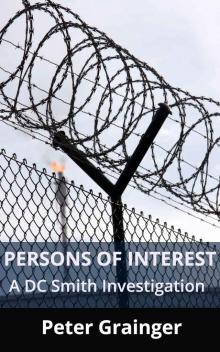 Persons of Interest
Persons of Interest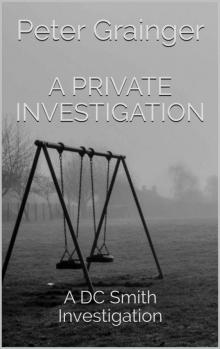 A Private Investigation
A Private Investigation Songbird
Songbird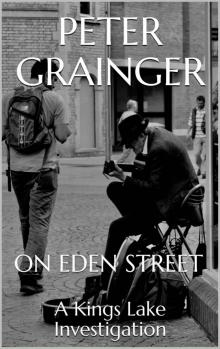 On Eden Street
On Eden Street An Accidental Death
An Accidental Death Time and Tide
Time and Tide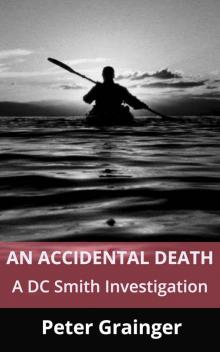 An Accidental Death: A DC Smith Investigation
An Accidental Death: A DC Smith Investigation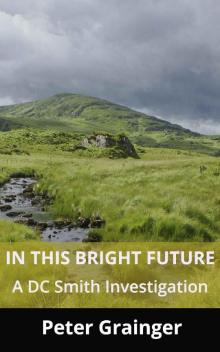 In This Bright Future
In This Bright Future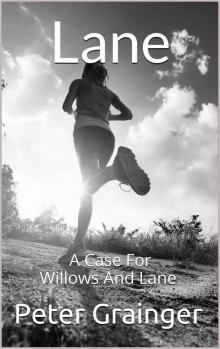 Lane: A Case For Willows And Lane
Lane: A Case For Willows And Lane The Rags of Time: A DC Smith Investigation
The Rags of Time: A DC Smith Investigation Luck and Judgement
Luck and Judgement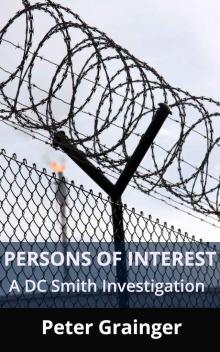 Persons of Interest: A DC Smith Investigation
Persons of Interest: A DC Smith Investigation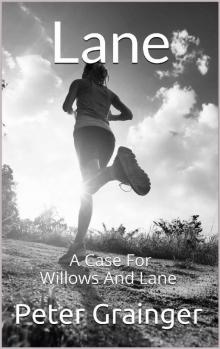 Lane
Lane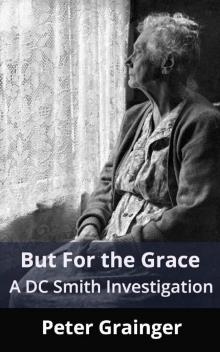 But For The Grace
But For The Grace Time and Tide: A DC Smith Investigation
Time and Tide: A DC Smith Investigation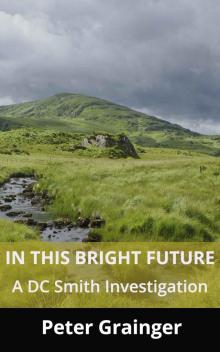 In This Bright Future: A DC Smith Investigation
In This Bright Future: A DC Smith Investigation The Rags of Time
The Rags of Time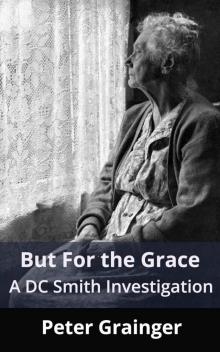 But For The Grace: A DC Smith Investigation
But For The Grace: A DC Smith Investigation Luck and Judgement: A DC Smith Investigation
Luck and Judgement: A DC Smith Investigation